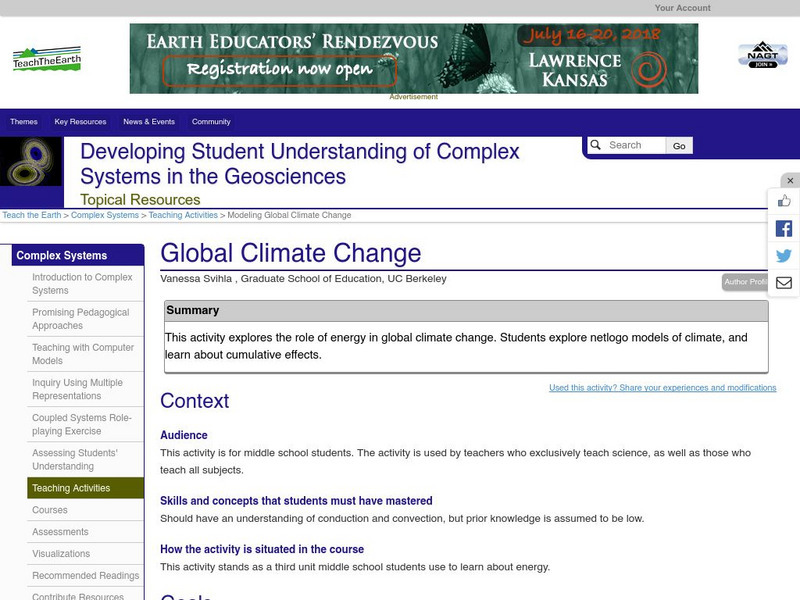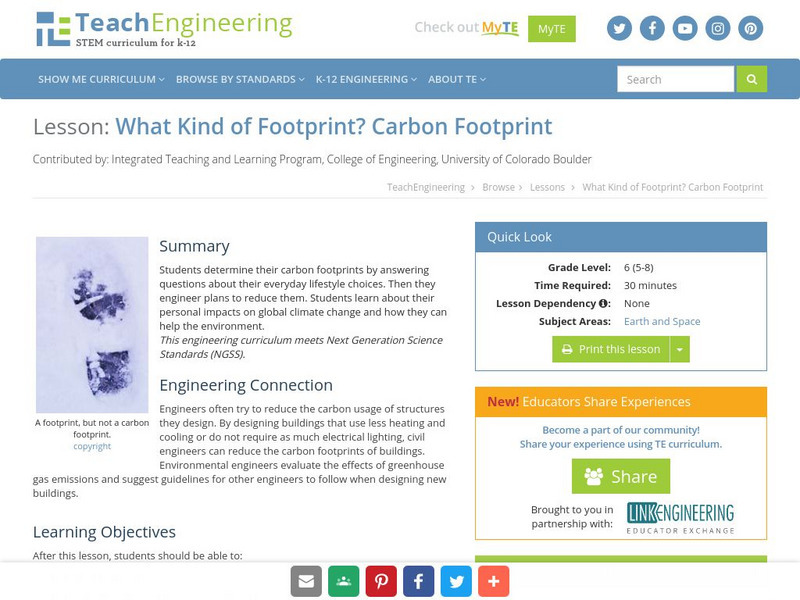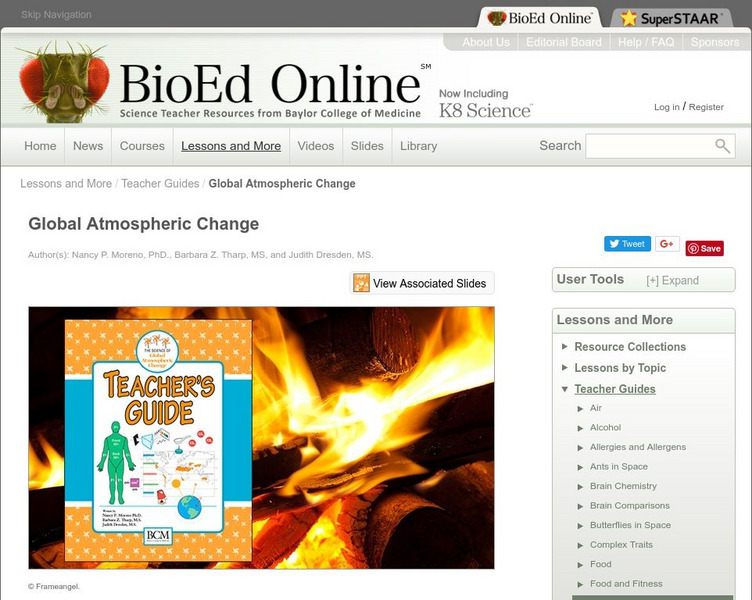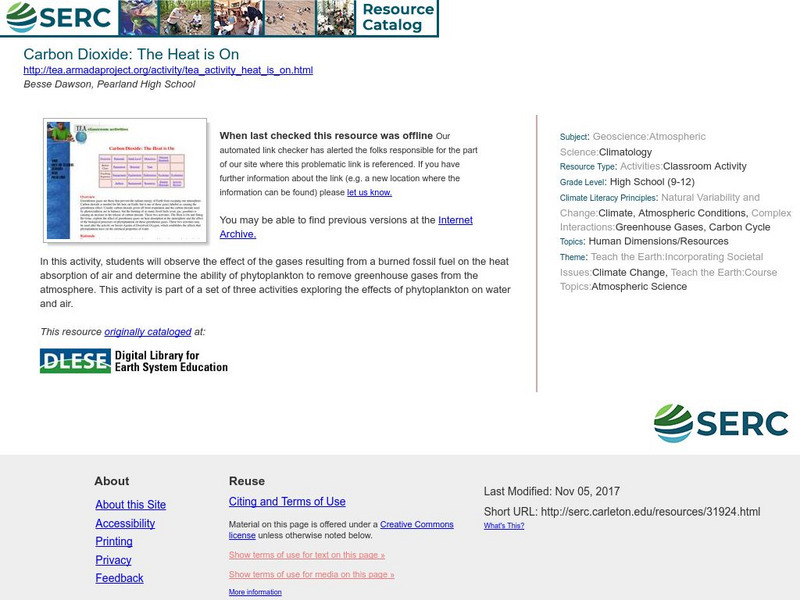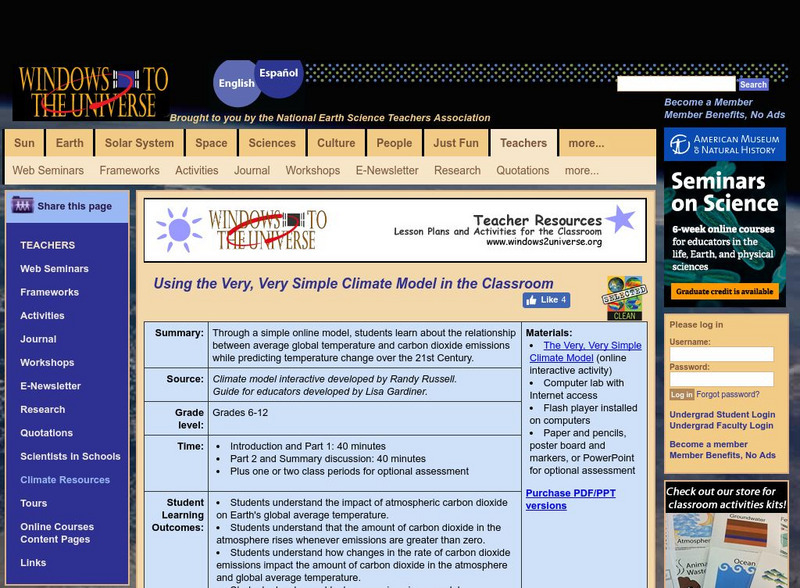Science Education Resource Center at Carleton College
Serc: Modeling Global Climate Change
Students will gain an understanding of global climate change by exploring the role that energy plays in it. They will explore NetLogo models of climate and learn about cumulative effects.
PBS
Pbs Learning Media: Global Climate Change: The Effects of Global Warming
Students conduct an investigation to determine CO2 levels in four different gas samples, examine evidence of global warming in our environment, and consider their own role in contributing to global warming.
Other
Student Activities: Greenhouse Warming, What Is It? [Pdf]
This lesson plan resource contains a series of activities that allow the students to learn about the issue of global warming. Requires Adobe Reader. [PDF]
PBS
Now on Pbs: Lesson Plan: Global Warming
Conduct research using a variety of primary sources to explore perspectives in the global warming debate.
TeachEngineering
Teach Engineering: What Kind of Footprint? Carbon Footprint
Young scholars determine their carbon footprints by answering questions about their everyday lifestyle choices. Then they engineer plans to reduce them. Students learn about their personal impacts on global climate change and how they...
BioEd Online
Bio Ed Online: Global Atmospheric Change
A teaching guide with eleven lessons on the atmosphere, and the impact that different kinds of energy have on the atmosphere and ecological systems. The unit and accompanying PowerPoint can both be downloaded.
PBS
Pbs Teachers: Earth's Warming Climate: Are We Responsible?
We obviously don't want to feel responsible for the warming climate, but are we? In this lesson plan you will analyze CO2 data sets and study barriers involved in teaching about global climate change. PBS TeacherLine also provides a...
Tramline
Tramline: Getting Green Virtual Field Trip
In this comprehensive website, young scholars will learn about different forms of pollution, environmental impact of pollution, global warming, and things they can do to make a difference.
Smithsonian Institution
Smithsonian Learning Lab: Prehistoric Climate Change and Why It Matters Today
In a lesson in this issue of Smithsonian in Your Classroom, students do the work of a team of paleontologists studying a time of rising carbon dioxide and rapid global warming during the Eocene epoch. By examining fossils of tree leaves,...
Science Education Resource Center at Carleton College
Serc: Carbon Dioxide: The Heat Is On
In this activity, students will observe the effect of the gases resulting from a burned fossil fuel on the heat absorption of air and determine the ability of phytoplankton to remove greenhouse gases from the atmosphere. This activity is...
Science Education Resource Center at Carleton College
Serc: Topic Guide: Paleoclimate
In this activity students form groups, conduct research into paleoclimate, and report their findings in the form of a presentation.
PBS
Pbs Teachers: The Climate Change Skeptic's Argument
Lesson plan examines the possibility that the contemporary climate change is due to natural solar cycles. Objectives are to review the evidence of total solar irradiance, analyze data to understand the influence of solar variability, and...
American Museum of Natural History
American Museum of Natural History: Amazing Albedo
This lesson is a lab in which students use thermometers, white and dark paper, and lamps to measure differences in albedo between the light and dark materials. Connections are made to albedo in Antarctica.
National Earth Science Teachers Association
Windows to the Universe: Using the Very Simple Climate Model in the Classroom
Through a simple online model, students learn about the relationship between average global temperature and carbon dioxide emissions while predicting temperature change over the next century.
University Corporation for Atmospheric Research
Ucar: Comparing Planetary Gases
Use jelly beans to compare the compositions (amounts of different gases) of the atmospheres of Earth, Mars, and Venus.
PBS
Pbs Teachers:world in the Balance: Who Will Take the Heat?
Examine the environmental, economic and political issues surrounding global climate change policy. Conduct a role-play, and explore the options available to tackle global climate issues.


